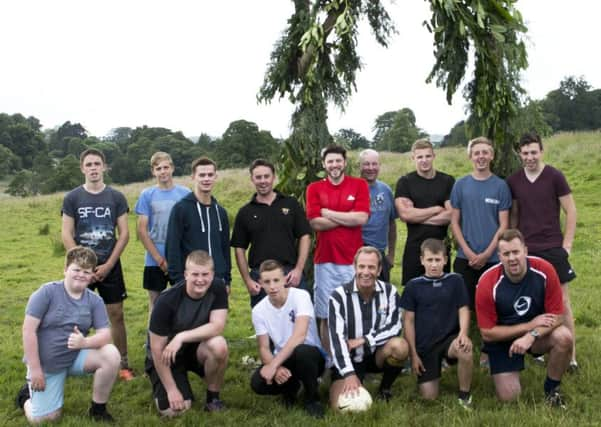Robson Green experiences thrills and spills of Shrovetide football


The television star travels along the route of the Great Whin Sill – the rock formations that give the county its distinctive rugged landscape – during Monday night’s episode.
A large part of his time is spent in Alnwick, where he meets the Duchess of Northumberland and is given a taste of the town’s historic Shrovetide football match.
Advertisement
Hide AdAdvertisement
Hide AdThe Hexham-born star receives a guided tour of The Alnwick Garden’s Poison Garden, which is home to many deadly plants. It’s one of the attraction’s most quirky features and Robson asks the Duchess where the inspiration to create it came from.
She replies: “I was looking around the world at what was going on. There were apothecary gardens everywhere and it was the same sort of concept except they were being used to teach people about the curative properties of plants and I thought ‘boring’. Let’s teach them how they kill.”
It’s not often that the Home Office becomes involved with plants in the setting of a public garden, but in this instance a number of the ‘inmates’ have to have their very own licence to be there. Robson tells the Duchess that he has heard a rumour that illegal drugs are grown in the Poison Garden.
She points him in the direction of a collection of cannabis plants, although the Duchess has strong views on the Class B drug. She says: “Some people say that cannabis is not dangerous, but in fact it’s been genetically modified now and skunk is dangerous and when you smoke dope it can turn you psychotic. Just one spliff is all it takes, so it’s a little bit like Russian roulette. But it can also be fantastic for people who have MS, but it’s not something to play with.”
Advertisement
Hide AdAdvertisement
Hide AdAs part of his time with the Duchess, Robson asks her how she manages to turn the neighbouring Alnwick Castle into a family home.
The Duchess says: “I always think if your values and roots are strong enough, then everything else is okay. When the door is shut, we are there as a family in our kitchen and that is what is important and the rest of it is a job.”
The imposing castle overlooks the Pastures, which is turned into a football pitch once a year for Alnwick’s Shrovetide fixture. In Monday night’s episode, Robson experiences some of the thrills and spills of the annual match, played between the parishes of St Michael and St Paul.
He joins a group of local players, including veteran competitor Steven Temple, for a kick-about and then dives into the River Aln for the customary scramble to reach the match ball, which is always kicked into the water at the end of the contest.
Advertisement
Hide AdAdvertisement
Hide AdAs Robson soon discovers, the Shrovetide match is not your usual game of football – with few rules, no-holds-barred tackling and plenty of divots, bumps and mud.
Wearing a vintage Newcastle United football strip for the occasion, Robson says: “Shrovetide football is brutal, very exciting and dramatic. It might not be as well known as the FA Cup or Wimbledon, but once a year Alnwick hosts one of Northumberland’s great sporting occasions.
“When it comes to drama, excitement, entertainment, fun and something that sums up the heritage and history of Northumberland, Alnwick’s Shrovetide football is in a league of its own.”
As part of his Shrovetide experience, he speaks to Temple and secretary Archie Jenkins, who both speak passionately and fondly about the tradition.
Advertisement
Hide AdAdvertisement
Hide AdAlnwick isn’t the only place on Robson’s radar in Monday night’s episode, to be screened on ITV at 8pm. His journey begins at the Farne Islands, with the story of Grace Darling, the lighthouse keeper’s daughter whose act of heroism made her one of the biggest celebrities of the Victorian age.
Robson says: “175 years on, the story of a young girl who braved a storm in a tiny coble boat still captures the public imagination and she remains an icon of the Northumberland coast and is one of Britain’s greatest heroines.”
He meets Virginia Mayes-Wright from the Grace Darling Museum at the village’s St Aidan’s Church, where Grace is buried in the churchyard. Asked by Robson why Grace captures the imagination, Virginia says: “She epitomises the value of heroism – going into the unknown, not knowing whether you’re going to come back. I think that is what pulls at our heart strings.”
Robson’s final chapter in Monday’s episode is at Hadrian’s Wall, where he tries his hand at making Roman pottery.
Advertisement
Hide AdAdvertisement
Hide AdReflecting on his journey along the Whin Sill, Robson says: “It is the very backbone of Northumberland. It is what makes the county so rugged, distinctive and spectacular. Some of Northumberland’s most famous landmarks were built on it – castles like Dunstanburgh, Bamburgh and Lindisfarne – and it was the perfect base for the Romans to build their defences on.”